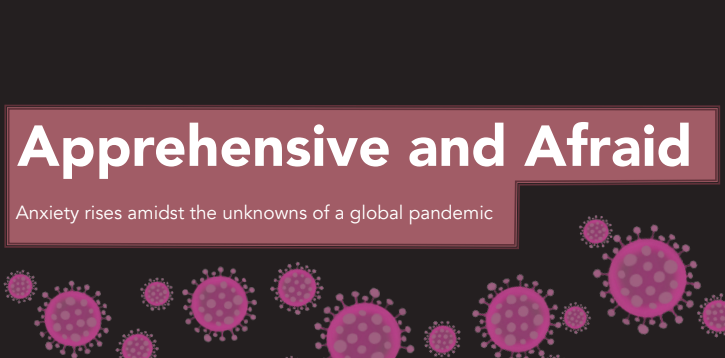Apprehensive and Afraid
Anxiety rises amidst the unknowns of a global pandemic
Photo: Trinity Cannon
What amount of anxiety is normal, and what crosses the line?
Dr. Annie Gadiparthi, a child psychiatrist who works in Memphis, knows there isn’t a definitive answer. Instead a delicate balance is required.
“To have some form of anxiety is a healthy thing, actually,” she said. “It protects us and ensures that we stay cautious and prepared.”
But according to a study published by the Journal of Abnormal Psychology in 2019, the teenage mental health crisis has been growing annually. Rates of depression and anxiety have been on a steep upward trend since at least 2005.
Then in came COVID-19.
COVID has put that survival mechanism to the test. Dr. Gadiparthi understands the toll the virus has taken on people, especially teenagers — and their social lives.
“Usually we think of extroverted people as really suffering, but I feel like it’s been everybody,” she said. “Introvert, extrovert, it doesn’t matter.”
Junior Mary Alice Murphy can attest to that fact. A self-described “introverted-extrovert,” she said she found herself reluctant to go back to her pre-pandemic social life at first.
“We’ve been alone for so long, and I got used to that,” she said. “When everything started to open back up I was like, ‘oh gosh, I’ve definitely developed some sort of anxiety’.”
At the beginning of the year, Murphy wished she still had the option to stay home and attend classes remotely, even if it was more difficult for her to learn while doing so.
“It’s easier to be here for the workload, but it’s definitely a lot harder for my mental state,” she said.
Still, she missed the most mundane things from before the pandemic. For her, it was going to the store without being worried that she would catch the coronavirus.
“Oh gosh, the person behind me is coughing, and we’re gonna get COVID,” she said.
It’s not just the grocery store, though. She was excited to come back to school in the fall of 2020, especially after three months of solely online school. But that initial excitement faded very quickly when anxiety set in.
“I was excited to go to school, and then that first week was just miserable for me,” she said. “Oh my gosh, there’s so many people, I’m only used to my small little circle.”
Dr. Gadiparthi noticed something similar in her patients post-pandemic. Frequently, concerned parents would come to her with questions about their children.
“Is it normal for a teenager right now to isolate? Is this a symptom of depression or something more going on?” she said. “So I think just understanding and navigating — is this really a mental health issue or is this normal? That’s been the biggest thing.”
What Dr. Gadiparthi has seen in her patients is a trend well documented by the CDC. Stress, anxiety, grief and more have become commonplace during the pandemic.
Ms. Kim Finch, the middle school guidance counselor, has observed the same. The worry brought on by the reality of a global pandemic has been anything but beneficial.
“I think you will find nationally increased rates of depression and anxiety that’s able to be diagnosed,” Mrs. Finch said. “There is an overall increased or heightened sense of worry and of the unknown.”
So how do people learn to overcome these new fears and worries?
Dr. Gadiparthi’s advice as a board-certified psychiatrist on what to do when you’re feeling overwhelmed like so many others during the pandemic is fairly simple.
“So I think that it may just mean getting back to the basics of getting getting six to eight hours of sleep, making sure to get good rest, making sure to do something that’s nice for yourself,” she said.
The CDC recommends seeking out professional help if you are struggling, especially during a time of crisis like the pandemic.
Mr. Zack Adcock, 9th grade team leader and English teacher, shared his piece on what surprised him most about the pandemic. It wasn’t virus transmission rates, mask mandates, or anything of the kind.
“I think the remarkable piece is how resilient people are in responding to challenge and change,” he said.






